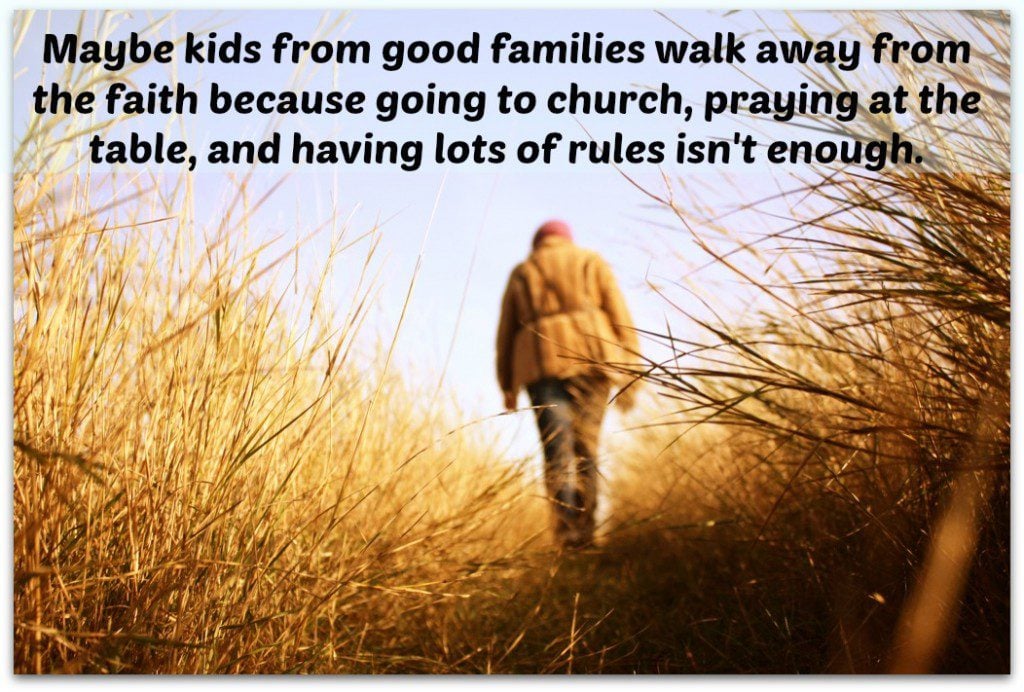This post originally appeared at Teach 4 the Heart and has been re-posted here with permission by the author.
What causes Christian teens from good churches and good families to leave the faith as an adult? This question plagues parents, teachers, pastors, and youth workers. And I’ll be honest – I don’t know what the answer is.
I do know I’ve seen too many of my friends and classmates either slowly drift away and get out of church or disregard the faith completely. It’s tragic and sad – and it makes me wonder why it happens so often.
Proverbs 22:6 says “Train up a child in the way he should go, and when he is old, he will not depart from it.” There is much debate over this verse (is it a promise or just a proverb?) but it seems pretty straightforward to me. The question we then run into, though, is why do kids from good Christian homes turn away from the faith?
Maybe (and as I said, I don’t really know), they were never really trained. Just sending kids to church, praying at the table, and having lots of rules isn’t training. Maybe too many of us aren’t doing all we can to pass on our precious faith to the next generation.
I don’t know why it happens so often, but a few thoughts come to mind.
Reasons Young Christians Might Walk Away
- The faith they see isn’t real. Young people have an innate sense to detect hypocrisy, and being fake is the unpardonable sin in their eyes. And rightly so – how can you learn from someone who isn’t being authentic with you? Hypocrisy in the church and home comes in various forms, and I think more of us are part of the problem than we care to realize. When we stick to old rules that have no basis in Scripture and the only explanation we can give our kids for them is a combination of stammering and canned lines, our kids can tell that this aspect of our faith is not real. Or when we put up a good front in an attempt to “be a good example” instead of being authentic about our struggles, this turns kids off. Quickly. And we also lose the opportunity to show them how real and life-changing our faith truly is.
- They don’t develop their own relationship with God. The one and only all-encompassing aspect of true Christianity is our relationship with God. It’s not about the rules, it’s not about the worship service, and it’s not even about our outreach. All of these things must come FROM our relationship with God. If that doesn’t come first, all the other aspects seem forced and unnatural – and easy to leave behind. [For more about my experience with this, see my post How to Fall in Love with God.]
- They get a distorted view of Christianity. Many churches (or homes or schools) lean too far to one side or the other. Some speak of love and grace so much that they neglect to preach against sin and its consequences. Others take strong stands against unrighteousness but fail to properly demonstrate God’s love and grace. Neither of these one-sided approaches rings true because both grace and truth are integral to the faith. We must teach young people the whole counsel of God – the true amazing paradox of Christianity.
- They aren’t properly discipled. I think this one is huge. In order for kids to truly make the faith their own, they need to be intentionally discipled – and that means that the parents (and hopefully also teachers, youth workers, etc.) have a strong relationship with them and talk to them about every aspect of their lives. They must speak to their hearts – truly digging down to the heart issues in every encounter. And when disciplining, yelling or just issuing a punishment doesn’t cut it for a teenager. Yes, they may “learn their lesson,” but their heart won’t be changed. True discipleship takes lots of time and effort, and it’s a daily process. I don’t think this happens in a lot of homes, but I think that if it did, far fewer teens would go astray.
- They fall into the trap of the slow fade. Up to this point, I’ve suggested that a lot of the blame belongs to the parents and other influences in their lives. But in reality, each person makes his own decisions. And from what I’ve seen, for many it’s simply a slow fade – one small decision away from church followed by another and another. Each seems insignificant and not that big of a deal, until suddenly they’re far away. Only it wasn’t suddenly – it was a gradual decline – one small step at a time.
I just can’t end on that depressing note. If these are some of the contributing factors (and I think in many cases it’s a combination of them), that’s good news because we can make a huge difference in the next generation by reversing these trends. We can be authentic, give them a true view of Christianity, and help them develop a personal relationship with God. We can take the time every day to disciple them and warn them about the trap of the slow fade. This is one of the highest callings we have as Christians. The Great Commission commands us to make disciples of all nations – and we simply cannot neglect to make true disciples of our own children.
What do you think? Are these factors contributing to the problem? Why do you think young Christians turn aside? What can we do differently to successfully pass on our faith to the next generation? Share your thoughts with a comment below or join the discussion on the original post.
Photo by Barcaw
Linda Kardamis is a teacher and writer who is passionate about helping parents and teachers impact the next generation. She is the author of Create Your Dream Classroom and blogs at Teach 4 the Heart. You can follow her on Twitter, Facebook, and Pinterest.













